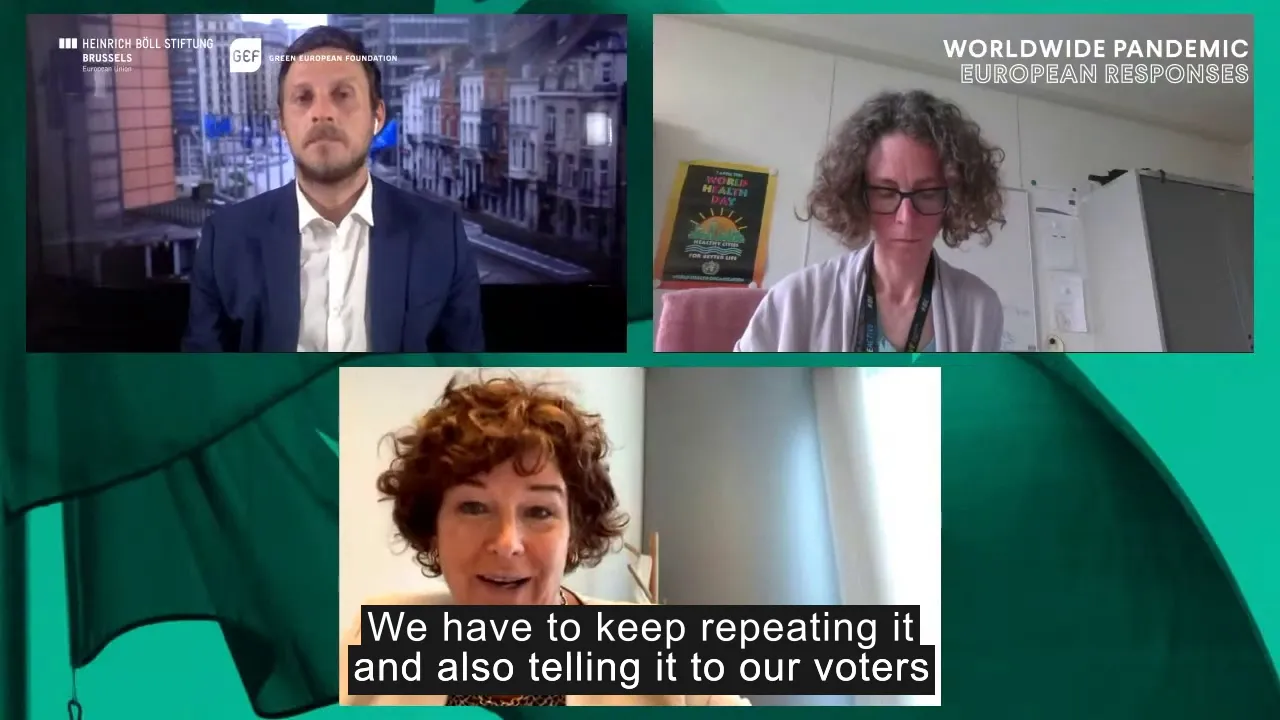Worldwide Pandemic, European Responses
Online discussion series by the Heinrich-Böll-Stiftung European Union and the Green European Foundation
Public health and societal resilience: which role for the EU? - 2 July 2020
The ongoing COVID-19 pandemic has exposed the fragility of the European Union as it led to uncoordinated, divergent approaches by the European Union’s Member States in the quest to stop the spread of the virus and protect their citizens’ health. One of the reasons for the lack of coordination certainly lies in the fact that healthcare remains a competence of the member states. Although the EU’s role should be complementary to the member states’ policies, the individualistic approaches by the EU governments and the lack of information sharing about them made such coordination nearly impossible at the beginning of the pandemic. As most Member States are slowly easing lockdown measures with daily infection rates and casualties fortunately decreasing, the EU seems to slowly find its role in the crisis - having recently unveiled the proposal for a new Health programme (EU4Health) as well as increased resources to build a more resilient EU.
Public health and societal resilience: what role for the EU? - Green European Foundation
 Watch on YouTube
Watch on YouTube
Full recording
Covid-19: How can the general resilience of the EU and its members be strengthened? - Heinrich-Böll-Stiftung European Union
 Watch on YouTube
Watch on YouTube
Covid-19, public health and societal resilience: what role for the EU? - Heinrich-Böll-Stiftung European Union
 Watch on YouTube
Watch on YouTube
What future for economic and monetary policy in the EU? - 16 July 2020
The COVID-19 pandemic has brought life to a standstill across the globe and the resulting halt in production, interrupted supply chains worldwide, and a drop in consumption have plunged our economies into a severe crisis. Within the EU, the countries hardest hit by the pandemic – Italy and Spain – were also among the member states that suffered most under the European debt crisis a decade ago. Immense efforts and support from financially stronger member states will be needed for their recovery.
What future for economic and monetary policy in the EU? - Green European Foundation
 Watch on YouTube
Watch on YouTube
Full recording
Covid-19: Will we see a further integration with a fiscal union following the monetary union? - Heinrich-Böll-Stiftung European Union
 Watch on YouTube
Watch on YouTube
Covid-19: Risks and opportunities for the EU borrowing money from financial markets - Heinrich-Böll-Stiftung European Union
 Watch on YouTube
Watch on YouTube
Covid-19 & economic and monetary policy: level of debt, taxation at EU level and sustainable economy - Heinrich-Böll-Stiftung European Union
 Watch on YouTube
Watch on YouTube
The impacts of Covid-19 on the Western Balkans and the region's political future - 21 October 2020
The COVID-19 pandemic not only hit the Western Balkan countries in a period of reacceleration of economic activity and put enormous pressure on the already fragile health systems in place, but also had a negative impact on the state of democracy in the region. In response to the outbreak of the virus, some governments relapsed into authoritarian tendencies increasing censorships and restricting the free flow of information. Cases of arbitrary arrest, surveillance, phone tapping, privacy breaches and other digital rights violations during imposed emergency legislation have become an increasing concern.
The impacts of Covid-19 on the Western Balkans and the region’s political future - Heinrich-Böll-Stiftung European Union
 Watch on YouTube
Watch on YouTube
Full recording
Covid-19: Freedom of movement, press and speech in the Balkan region during the pandemic - Heinrich-Böll-Stiftung European Union
 Watch on YouTube
Watch on YouTube
Covid-19: Election procedures and digital rights in the Balkan region - Heinrich-Böll-Stiftung European Union
 Watch on YouTube
Watch on YouTube
Covid-19 & Balkans: What impact has the pandemic had in Bosnia Herzegovina? - Heinrich-Böll-Stiftung European Union
 Watch on YouTube
Watch on YouTube
How has government handled the pandemic and how did Civil society respond in north Macedonia? - Heinrich-Böll-Stiftung European Union
 Watch on YouTube
Watch on YouTube
European mobility in the context of Covid-19: Keeping the green steering wheel steady? - 19 November 2020
The challenges related to a sustainable transition of the European mobility sector were already manifold before the Covid-19 pandemic hit. Motorised mass transport has reached its limits, mass tourism has massive ecological and social impacts, and EU governments have not been acting fast enough to re-direct investments from a carbon-intensive transport sector to more climate-friendly means of transports, e.g. trans-European railways. How can the EU ensure uninterrupted transport and supply chains, e.g. for medical equipment? What will be the opportunities and challenges of a progressing digitisation of European transport? How will the pandemic shape the future of free movement within the EU? What should international tourism look like in a post-Covid-19 world? How can a just transition of the mobility sector contribute to ambitious climate targets?
European Mobility in the context of Covid-19: Keeping the green steering wheel steady? - Heinrich-Böll-Stiftung European Union
 Watch on YouTube
Watch on YouTube
Full recording
European Mobility in the context of Covid-19: Keeping the green steering wheel steady? - Heinrich-Böll-Stiftung European Union
 Watch on YouTube
Watch on YouTube
How will the Covid-19 pandemic shape the future of free movement within the EU? - Heinrich-Böll-Stiftung European Union
 Watch on YouTube
Watch on YouTube

